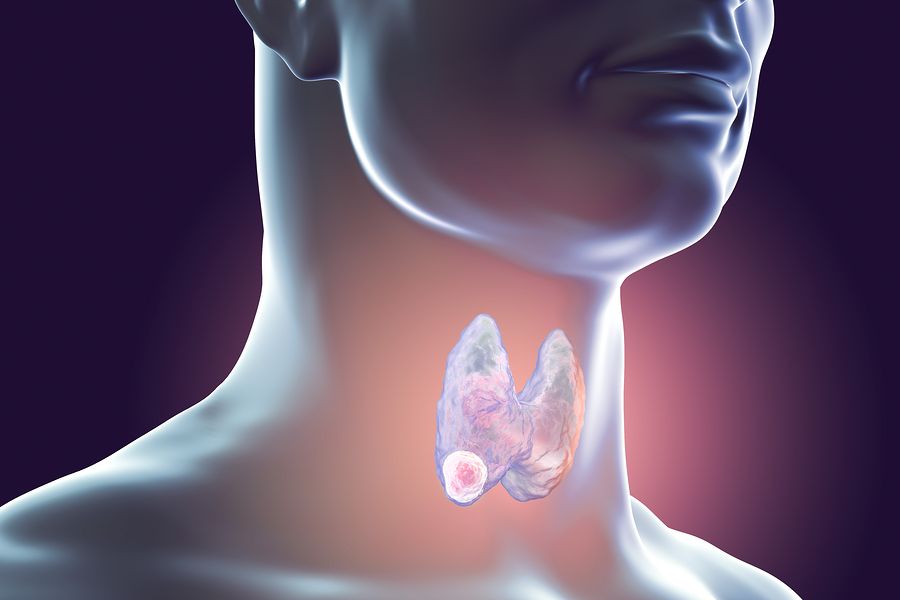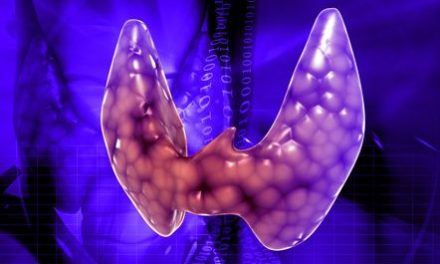This report is written for people who had high scores on the Thyroid portion of our Health Questionnaire. Obviously a simple health questionnaire cannot diagnose disease. This material is put together for educational purposes and is not meant to diagnose or treat any disease.This report is not meant to offer a diagnosis or treatment of disease. Similarly, health questionnaires do not diagnose disease; they merely make you aware of potential health problems and create a basis for a conversation with your physician.
Generally when a patient exhibits symptoms of hypothyroidism (similar to those on the questionnaire), the diagnosis is made by testing TSH (thyroid stimulating hormone), which is a hormone produced by the pituitary gland. TSH stimulates the thyroid to produce its hormones. If the TSH is high, it may be a sign of hypothyroidism because the pituitary has to work very hard to get the thyroid gland to work. It is important to know that there are other thyroid tests and that symptoms of hypothyroidism may exist even when TSH levels are normal.
The British Medical Journal [BMJ 2000;320:1332-1334 ( 13 May )] published research examining the flaws in diagnosing hypothyroidism. The authors concluded that there are flaws with the way that we diagnose hypothyroidism. First of all, the research is lacking that shows us the relative importance of lab tests and symptomatology in diagnosing the thyroid. TSH production is affected by the level of thyroid hormone, but it is also affected by other things. We don’t fully understand how various illnesses affect TSH and the thyroid hormones. There is also a need to consider the possibilities of false positive and false negative results when looking at lab tests related to the thyroid.
As many as 13 million Americans may have an undiagnosed thyroid problem, according to a study known as the Colorado Thyroid Disease Prevalence Study. The study was performed by Knoll Parmaceutical (makers of Synthroid). Over 25,000 participants were studied in 1995. The researchers found that nearly 9% of the participants who were not on thyroid medication were hypothyroid and a little over 1% were hyperthyroid. If this number were extrapolated to the entire US population, the number of patients with an undiagnosed thyroid problem would number 13 million. The study also found that even “subclinical” hypothyroidism, may raise cholesterol levels.
Possible Signs and Symptoms:
Below are some of the symptoms of hypothyroidism. All of the symptoms need not be present for the patient to have hypothyroidism. Also, an underfunctioning thyroid can lead to high cholesterol, heart disease and immune system problems.
- Low body temperature. Patient feels cold even when others do not.
- Lack of motivation
- Poor memory
- Loss of interest in sex
- Dry, itchy or scaly skin
- High cholesterol
- Muscle cramps at rest
- Constipation
- Cysts and fibroids
- Sadness or crying for no reason (This can include women who have this symptom or experience mood swings at certain times during their menstrual cycle)
- Inability to lose weight
- Puffiness under the eyes
- Ankle swelling
- Depression
- Frequent colds
Hypothyroidism may be a cause of depression. Research appearing in the American Journal of Psychiatry (March 1993;150:3:508-510) suggests that the thyroid may be involved with some cases of depression. It was a small study that looked at 16 patients with subclinical hypothyroidism and 15 with normal thyroid function. The frequency of depression over the course of a lifetime was higher in the group with subclinical hypothyroidism.
Many doctors using natural health care will rely on a basal body temperature test. Dr. Broda Barnes was critical of the lab work available to diagnose hypothyroidism. Dr. Barnes felt that the basal body temperature should be between 97.8 and 98.2 degrees. If a patient has a low basal body temperature and hypothyroid symptoms, that is justification to treat the thyroid. The problem is that many things can cause a low temperature. Using basal body temperature and symptoms to make this diagnosis is also unsatisfactory.
It is important to understand how to diagnose hypothyroidism. So many health problems are linked to it. Many people are on antidepressants, but may need thyroid support. Hypothyroidism can cause high cholesterol and heart disease. Could it be that the patient who is on cholesterol lowering medication should actually be getting thyroid support? Hypothyroidism can be responsible for miscarriages. If an expectant mother has hypothyroidism and doesn’t miscarry, her baby will have a lower IQ than if her thyroid was normal. Problems losing weight, dry skin and immune system problems may have the thyroid at their root.
Hypothyroidism has been shown to be a risk factor for cardiovascular disease. Now, research appearing in the Annals of Internal Medicine (2000; 132(4):270-8) shows that subclinical hypothyroidism and thyroid autoimmunity can also increase the risk of heart disease. In subclinical hypothyroidism, patients do not have the symptoms of hypothyroidism, but their blood tests indicate an underfunctioning thyroid. Women in the study had a 70% higher chance of having hardening of the aorta (the largest artery in the body), and more than two times the risk for a heart attack than the group with normal thyroid hormone levels. It is estimated that 17% of all older Americans have subclinical hypothyroidism.
In the study, even after statistically adjusting for all the other factors affecting heart disease risk — including weight, smoking, cholesterol levels, and blood pressure — women with hypothyroidism were 70% more likely to have hardened aortas than those with normal hormone activity. They also had more than twice the risk of heart attack. Having autoimmune hypothyroidism increased the risk even further. The researchers concluded that subclinical hypothyroidism is a strong indicator of risk for atherosclerosis and myocardial infarction in elderly women.
A number of health problems improve when hypothyroidism if diagnosed and treated. Here are a few of the health problems that may have hypothyroidism at their root:
- Obesity and trouble losing weight
- Fatigue
- Depression
- High Cholesterol
- PMS
- Ovarian cysts
- Uterine fibroids
- Dry skin
- Some headaches (usually one that starts in the morning and fades as the day goes on)
- You can prevent heart disease, miscarriages and improve the IQ of the newborn.
Fortunately, a number of doctors have been wrestling with this problem and there are now ways to combine lab information with symptomatology to come up with a diagnosis.






